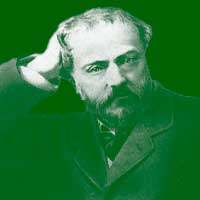
Emmanuel Chabrier
Do you know the music of French composer Emmanuel Chabrier, who lived from 1841-1894? Oh yes, you might say, you know and love España, his most popular work for orchestra. But do you know the rest of his music? España is only about seven minutes long. And there is more to Chabrier’s music than that – a lot more.
With the 2024 Olympics taking place in Paris this month, this is a good time to learn more about this influential French composer.
About Emmanuel Chabrier
Emmanuel Chabrier (1841–1894) was a French Romantic composer and pianist whose sparkling works somehow captured the spirit of Paris in the 1880s. He was friends with Manet, and he knew Baudelaire. Chabrier’s love for art led him to collect Impressionist paintings long before they became fashionable. And the music he wrote was charming, unique, and ineffably Gallic.
Born on January 18, 1841, in Ambert, Puy-de-Dôme, France, Chabrier’s musical journey was unconventional. His bourgeois family initially disapproved of his plans to pursue a musical career, demanding that he study law. However, his passion for music persisted, and he immersed himself in the artistic life of the French capital while working as a civil servant until 1880, when he quit his bureaucratic job and devoted himself completely to composing.
Chabrier’s compositions span various genres, but he is best known for his orchestral work España, that beautiful short piece which, inspired by Spanish rhythms and colors, remains one of his most celebrated compositions.
In addition to that orchestral gem, Chabrier left a significant body of other pieces for orchestra, operas, and voice. His compositions often defied established rules, perhaps because he lacked formal academic training. That freedom allowed him to create a unique musical language.
Chabrier’s middle-ground approach to Wagnerian influences set him apart during a time when French musicians were either proponents or opponents of Wagner’s music. He skillfully incorporated Wagnerian harmony and colors into some works without adopting outright Wagnerianism.
Chabrier’s life was cut short by a neurological disease, possibly caused by syphilis. (Hey, Schubert had it too.) He passed away in Paris on September 13, 1894, at the age of fifty-three.
España for Orchestra
Let’s start our exploration of Chabrier’s opus by listening to his most famous piece, España. Chabrier wrote it in 1883 after a trip to Spain. Initially, he worked on it as a piano duet, but it evolved into a work for full orchestra. España captures the excitement and flavor of Andalusian music that Chabrier heard during his travels. His imaginative instrumentation adds to its charm.
* To listen to España on Classical Archives, CLICK HERE.
Suite Pastorale for Small Orchestra
Chabrier’s Suite Pastorale, composed in 1888, is a completely charming, 10-minute, four-movement composition for small orchestra that can serve as a perfect introduction to his works. Chabrier selected and orchestrated the movements from an earlier piano work, Dix pièces pittoresques. It was first performed on November 4, 1888, in Angers, conducted by Chabrier himself. Listen and be charmed!
* To listen to Suite Pastorale on Classical Archives, CLICK HERE.
L’Etoile, Chabrier’s Operatic Masterpiece
Chabrier wrote a dozen operas and operettas, some of which were performed in major opera houses in Brussels and Paris. One of the more notable was the three-act comedy Le Roi Malgré Lui, (“The King in Spite of Himself”), which was first performed at the Opéra Comique in Paris in 1887. But the most successful and enduring of his operas was L’Etoile (“The Star,” sometimes called “The Lucky Star,”) which was premiered at the Théâtre des Bouffes Parisiens in 1877, and which is often performed today.
This opera, hailed by Stravinsky as a “masterpiece,” demonstrates Chabrier’s wit and creativity.
* To listen to selections from L’Etoile on Classical Archives, CLICK HERE.
Songs
Chabrier composed a number of songs for solo voice with piano accompaniment. Many are notable for their humor, charm, and gentle satirizing of the more serious art songs of his time.
Chabrier composed his first songs between 1862 and 1866 to texts by such notable poets as Théodore de Banville and Alfred de Musset. Later after he left his job at the Ministry of the Interior in 1880, Chabrier set texts by major poets, including Victor Hugo and Charles Baudelaire.
Some of Chabrier’s songs are unique in the nineteenth century for their wit. Two notable examples are the “Villanelle des petits canards” (“Villanelle of the little ducks,”) and the “Pastorale des cochons roses” (“Pastorale of pink pigs.”).
* To listen to “Pastorale des cochons roses” by Emmanuel Chabrier, CLICK HERE.
Chabrier’s Influence on Later Composers
Traces of Chabrier’s unique and iconoclastic style can be heard in the music of Claude Debussy (1862-1918), Maurice Ravel (1875-1937), Erik Satie (1866-1925), Francis Poulenc (1899-1963), Darius Milhaud (1892-1974) and Arthur Honegger (1892-1955).
As the 2024 Olympics enter into history, let’s raise a toast to Chabrier, a great and uniquely French composer.
* Please note that in order to listen, you must be a member of Classical Archives. If you are not yet a member, we invite you to join now. Free 14-day trial memberships are now available.









